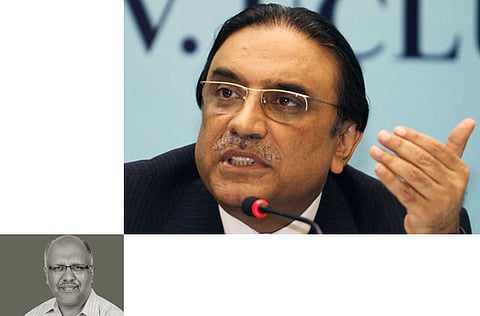Fallout of Pakistan's lawlessness
The country functions without a clear-cut security policy that has backing of parliament

Friday's elections for Pakistan's upper house of parliament, known as the senate, remained an inconsequential event for the country's mainstream.
Members of Pakistan's ruling structure celebrated the outcome of this latest election as a landmark in the country's democratic evolution, in an indication of the yawning gap between perception among the rulers and the reality.
The Pakistan Peoples Party (PPP), which leads the ruling coalition and has presided over one of the worst periods of the country's disarray in the past few years, gained a larger control over the senate.
Tragically for Pakistan though, the PPP indeed has little to show by way of strengthening the country. While the economy remains surrounded by a growing crisis, ordinary citizens increasingly lament their failure to gain access to basic needs such as quality health and education, not to forget a reliable flow of electricity and gas.
Meanwhile, in their blind determination to be seen as guarantors of an ill-conceived democratic consolidation, Pakistan's leaders remain clueless on the scale of the challenges haunting the country. On Friday however came just one of the many powerful and stark reminders of the gap between reality and imagination.
A group of human rights activists gathered at a street corner in Islamabad to hold a vigil in memory of Shahbaz Bhatti, a Christian politician and minister for non-Muslim minorities, who was slain in cold blood on a street of Islamabad, a year ago. Tragically for Pakistan, Bhatti has become just another number in a growing list of victims of senseless and bloody violence that has engulfed the country over the years.
While Pakistan's top leaders, notably President Asif Ali Zardari and Prime Minister Yousuf Raza Gilani, were handed over a legacy of blood when they took power in 2008, to their discredit, they have done little to ensure a reversal of that legacy.
On Friday, a consolidation of the PPP's control over the senate may have improved the numerical position of the party in the upper house of parliament. And yet, a pertinent question, which is indeed the way that this majority will be used to further the best interests of Pakistan, will continue to go unanswered as it was before the elections. As a follow-up to the senate elections, Zardari is expected to give his annual speech to a joint session of the two houses of parliament later this month.
For ruling politicians, Zardari's likely last speech before elections to the federal and provincial parliaments will most probably set the pace for coming political events. And yet even Zardari may not be in a position to provide convincing answers to a growing number of Pakistanis who are increasingly sceptical about their country's future.
Democratic framework
Going forward, the issues that will make a difference to the lives of Pakistanis will indeed be the ways in which the government is able and willing to tackle lawlessness of the kind that took Bhatti's life a year ago. For many Pakistanis, if the government failed to protect the life of a cabinet minister, its capacity to protect the lives of its country's ordinary citizens must be virtually absent.
Four years after the present dispensation came to power, Pakistan continues to function without a clear-cut security policy that has the backing of the parliament. Likewise, there is little progress that has been made in areas like a robust economic policy that is able to tackle the most challenging aspects of Pakistan's economic malaise.
In a country where more than one-third of the population or approximately more than 60 million people live below the poverty line, the idea of a democratic framework functioning successfully simply doesn't work in the absence of a robust plan to tackle impoverishment.
Going forward, the democracy whose roots are supposedly being deepened in Pakistan, does little to impress the mainstream population for it remains devoid of the ability to deal with real-life challenges.
In this environment, it is hardly surprising that while Pakistan's rulers take pride in their so-called democratic achievements, the bulk of the country's population remains unimpressed. It is also hardly surprising that many Pakistanis in their search for a more viable political alternative, are indeed turning to Imran Khan, the cricket star-turned-politician, as a possible next leader for the South Asian country.
Farhan Bokhari is a Pakistan-based commentator who writes on political and economic matters.



